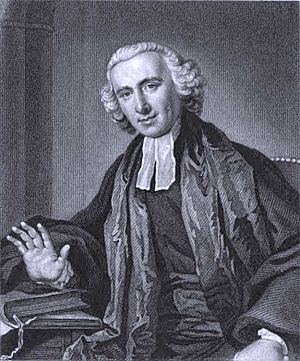William Romaine facts for kids
William Romaine (born in 1714 in Hartlepool – died in 1795) was an important religious leader. He was an evangelical minister in the Church of England. Evangelicals are Christians who focus on the Bible and a personal relationship with God. Romaine wrote several popular books, including a famous series called The Life, the Walk, and the Triumph of Faith.
Contents
William Romaine's Early Life
William Romaine was born on September 25, 1714. His family lived in Hartlepool, which is in County Durham, England. His father was a merchant who sold corn. Romaine's family had French Protestant roots. He went to school at Houghton-le-Spring Royal Kepier Grammar School. Later, he studied at Christ Church, Oxford, a famous university.
William Romaine's Ministry and Teachings
Romaine became a deacon in the church in 1736. This was his first step to becoming a priest. He worked as a curate in Loe Trenchard, Devon. In December 1738, he became a priest. After that, he served as a curate in Banstead, Surrey, and Horton, Middlesex, at the same time.
In 1739, Romaine got involved in a big discussion. It was about the ideas of another person named William Warburton. In 1741, he became a chaplain for the Lord Mayor of London, Daniel Lambert. This job allowed him to preach at St Paul's Cathedral, a very important church.
Around 1748, Romaine had a special experience. He became a strong evangelical Christian. He started teaching evangelical ideas to many people. He did this even though some church leaders did not agree with him. In 1748, he also became a lecturer at St George Botolph Lane in London. The next year, he took on two more lecturing jobs at St Dunstan-in-the-West in Fleet Street.
In 1750, Romaine had another chance to share his beliefs. He became an assistant preacher at St George's, Hanover Square. This was a very popular church in London. For a short time in 1751, he also taught astronomy at Gresham College. His friend, William Bromley Cadogan, said Romaine tried to show that "God was best acquainted with his own works." This meant Romaine believed God's own words in the Bible explained the world best.
From 1756, Romaine kept his job at St Dunstan's. He also worked as a curate and preacher at St Olave's in Southwark. He traveled a lot to preach, going as far as Yorkshire and the West Country. He also worked for Selina Hastings, Countess of Huntingdon, who was a big supporter of evangelical preachers. In 1766, after a long disagreement, he became the Rector of St Andrew by the Wardrobe.
Romaine was also very good at studying Hebrew, an ancient language. He worked on a large Hebrew dictionary and concordance. This was a book that helped people understand Hebrew words in the Bible. He published his revised version in four volumes between 1747 and 1749.
William Romaine passed away on July 26, 1795. He was buried in the church of St Andrew-by-the-Wardrobe.
William Romaine's Published Works
William Romaine wrote many books and essays. Here are some of his well-known works:
- Treatises Upon the Life, Walk and Triumph of Faith (a famous series of books)
- The Self-existence of Jesus Christ
- Living by Faith in Christ
- The Gospel
- The Legal Spirit slain
- At War and Yet At Peace
- Thy Walk with God
- Prayer
- Walk in Obedience to God
- Essay on Psalmody (published in 1775)
See Also
- Gresham Professor of Astronomy
 | Tommie Smith |
 | Simone Manuel |
 | Shani Davis |
 | Simone Biles |
 | Alice Coachman |


